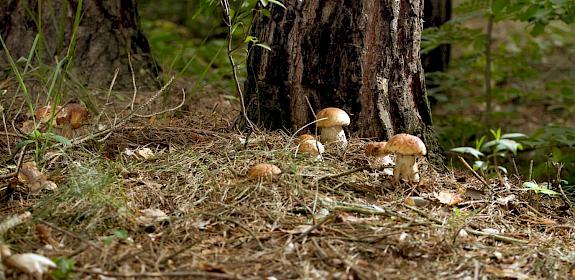Any collectors left? Experts examine social sustainability of wild plant harvesting in Central Europe
Budapest, Hungary, 25th October 2013—“Traditional and wild” project partners met earlier this month in Budapest to discuss the future of wild medicinal plant collection in Central Europe.
Participants of the workshop included the United Nations’ Food and Agriculture Organization (FAO), the Ministry of Rural Development in Hungary, the Association of Medicinal and Aromatic Plants of South East European Countries (AMAPSEEC), TRAFFIC and WWF Hungary, and other project partners of “Traditional and wild”.
The Central European “Traditional and wild ”project was instigated in part to preserve the traditional knowledge on wild plant collection in Hungary, Slovenia, the Czech Republic and Poland that is being lost because the flow of information from generation to generation has been disrupted through reasons including the weak economic incentives of collection and increasing urbanization of society.
The lack of knowledge can lead to unsustainable trade in certain species, which can affect livelihoods, and remove important sources of income from particular groups, including ethnic minorities, women and the elderly.
There is also a lack of incentives for people to get involved in wild plant collection, despite an abundance of wild plant resources and high levels of unemployment, particularly among the ethnic minorities (e.g. rural Roma communities in Hungary).
The disincentives include complexities over land ownership, access to resources, legal requirements to register as collectors (e.g. in Hungary), and the limited number of companies interested in purchasing the raw materials, which were currently commanding low market prices.
On average, the number of wild plant collectors in the region is estimated to halve in the past 20 years, but is closer to 90% in Serbia. These numbers are in contrast with the importance of the wild plant industry in the region, with exports from Albania estimated to reach the value of up to USD20 million a year and opportunities within the sector are being created.
The meeting further highlighted the importance of developing reliable statistics to monitor the trade and supply of all non-wood forest products and the need for an efficient reporting system at the national level.
Agnes Szenci from the Ministry of Rural Development in Hungary spoke about the national strategy under development for the wild collection and cultivation of medicinal and aromatic plants. The innovative approaches that are expected to feature in the strategy include the establishment of intragovernmental committee that will include branches of government working on issues of environmental protection, agriculture, rural development and health, the development of system to regulate wild plant harvesting in protected areas in Hungary and the establishment of a national certification scheme focusing on the quality and safety of plant products.
TRAFFIC’s Programme Officer, Kristina Rodina, highlighted about the relevance of the FairWild Standard to address the issues of social and ecological sustainability of wild plants harvesting and trade, illustrating this with existing practical examples of FairWild certification. She also spoke about the challenges of implementing the FairWild Standard in Central Europe and drew partners’ attention to the various tools being made available, including training for collectors of wild plants, and an online toolkit soon to be launched by TRAFFIC and WWF Hungary for use in Central Europe and beyond.
The meeting also examined research by Corvinus University of Budapest into the various harvesting methods used to collect Juniper berries Juniperus communis and how these can influence product quality and quantity as well as the sustainability of populations.
Participants concluded that while the ecological sustainability of medicinal and aromatic wild plant collection in the region is an important consideration, the current main concern is over the social and economic sustainability of wild collection practices and how it impacts on the livelihoods of collectors. Addressing this issue is challenging one, requiring collaboration between various government departments and including training of collectors, provision of employment opportunities, and simultaneous monitoring of the ecological sustainability of wild-harvesting. In this regard, lessons already learned for the Traditional and Wild project in Central Europe were considered useful for sharing in the region and beyond, perhaps beginning with replication of its activities in South-East Europe.

 This project is implemented through the CENTRAL EUROPE Programme co-financed by the ERDF
This project is implemented through the CENTRAL EUROPE Programme co-financed by the ERDF




